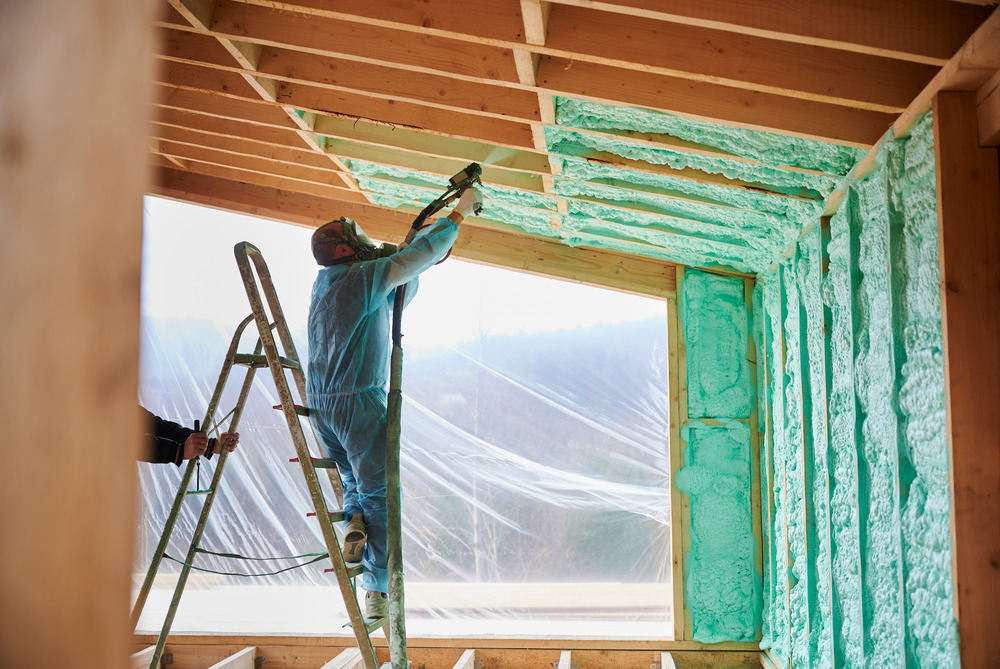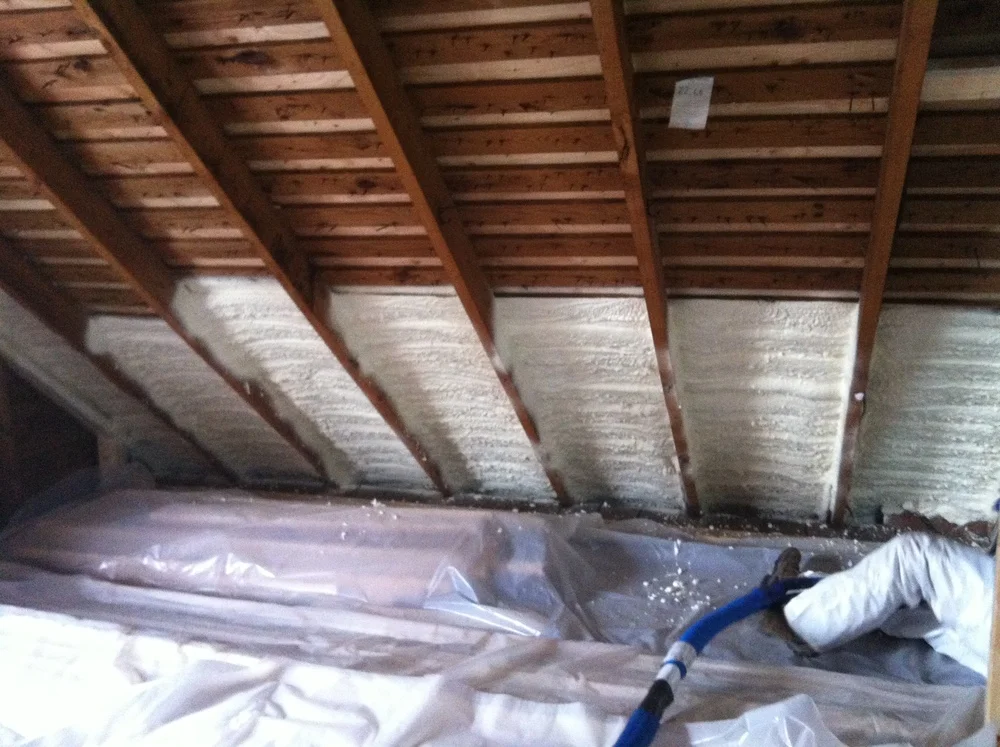Selecting the Right Type of Spray Foam for Your Insulation Needs
Selecting the Right Type of Spray Foam for Your Insulation Needs
Blog Article
Spray Foam: The Ultimate Remedy for Air Sealing and Insulation
Spray foam insulation has become a leading remedy for effective air sealing and thermal insulation, using an unique combination of buildings that establish it apart from standard techniques. Its capacity to increase and fill spaces makes it especially reliable in protecting against air leakage, which can considerably affect energy effectiveness. Understanding the full extent of its advantages, installment procedures, and contrasts with various other insulation types is vital for making notified decisions. As we check out these aspects, the ramifications for both new constructions and retrofits become increasingly significant. What variables should affect your selection?
What Is Spray Foam?
Spray foam is a flexible insulation material that incorporates the principles of air securing and thermal resistance to improve energy performance in buildings. Composed mostly of polyurethane or other comparable compounds, spray foam is used as a fluid that expands upon call with surface areas, producing a strong, constant layer of insulation. This unique residential or commercial property permits it to fill up gaps, fractures, and voids that typical insulation materials might neglect, giving a remarkable air seal.
There are 2 primary sorts of spray foam: open-cell and closed-cell. Open-cell spray foam is lighter and extra adaptable, supplying exceptional sound absorption and a reduced R-value per inch - Spray Foam. On the other hand, closed-cell spray foam is denser, supplying a higher R-value, wetness resistance, and added architectural stability to developing parts
The application procedure typically entails customized tools, ensuring a smooth application that adheres to different substrates, including steel, concrete, and wood. This adaptability makes spray foam suitable for both brand-new building and constructions and retrofitting existing frameworks. Its capability to create an impermeable barrier considerably adds to reducing energy usage and improving interior air quality, thereby making it a preferred selection among house owners and contractors alike.
Benefits of Spray Foam Insulation
Among one of the most significant benefits of spray foam insulation is its exceptional capacity to create a constant air barrier, which successfully reduces power loss. Unlike traditional insulation products, spray foam increases to fill up cracks and gaps, guaranteeing that air leakage is significantly decreased. This particular not only boosts energy effectiveness but also results in reduce energy costs with time.
Furthermore, spray foam insulation offers premium thermal resistance, adding to a much more stable indoor setting. Its high R-value per inch permits for efficient insulation in confined areas, making it ideal for attics, wall surfaces, and crawl rooms. In addition, the moisture-resistant homes of spray foam aid stop mold and mildew and mildew development, advertising much healthier living conditions.
One more vital benefit of spray foam insulation is its sound-dampening qualities (Spray Foam). It effectively decreases sound transmission in between areas, developing a quieter and a lot more comfy home atmosphere. The durability of spray foam additionally stands out, as it does not droop or settle over time, maintaining its performance throughout its life-span
How Spray Foam Works
Recognizing just how spray foam insulation functions is important for appreciating its performance in air securing and thermal resistance. Spray foam insulation is composed of 2 main parts: isocyanate and polyol resin. When these elements are blended, they undergo a chain reaction that causes the material to broaden swiftly, producing a thick foam that fills spaces, tooth cavities, and cracks.
As the foam increases, it sticks to surfaces, creating an airtight seal that dramatically lowers air seepage. This particular makes spray foam insulation very effective at avoiding drafts and moisture infiltration, which can lead to power loss and damages over time. Additionally, the closed-cell variation of you could try this out spray foam provides superior thermal resistance because of its rigid structure, successfully lessening warm transfer.
The special residential or commercial properties click for more info of spray foam allow it to satisfy uneven surfaces, guaranteeing extensive protection and a smooth barrier. Because of this, spray foam insulation not just enhances energy efficiency however additionally adds to enhanced interior air quality by minimizing the buildup of contaminants and allergens. Inevitably, comprehending the auto mechanics behind spray foam underscores its function as an exceptional choice for insulation and air sealing in both property and business applications.
Setup Process Review

Prior to setup, the room needs to be adequately cleaned up and prepped, making certain that surfaces are complimentary from dirt, particles, and dampness. Since contaminants can endanger adhesion and total performance, this step is crucial. As soon as the location is prepared, the application entails mixing the two components of the spray foam, which broadens upon contact and loads spaces successfully.
Trained specialists ought to conduct the setup, utilizing specialized devices to make certain uniform protection and optimal density. Safety and security precautions, including using safety gear and guaranteeing proper ventilation, are necessary during this procedure. After application, the foam usually cures quickly, developing a strong obstacle that enhances power efficiency.
Comparing Spray Foam to Traditional Insulation
When examining insulation choices, spray foam insulation sticks out in contrast to conventional materials such as fiberglass and cellulose. Among the primary advantages of spray foam is its superior air securing capabilities. Unlike fiberglass and cellulose, which can allow air infiltration, spray foam increases upon application, filling click to read more voids and crevices to create an impermeable seal. This causes boosted energy efficiency, as much less heated or cooled air leaves the home, causing reduced energy bills.
Additionally, spray foam gives a greater R-value per inch than conventional insulation kinds, using even more reliable thermal resistance in a thinner account. This particular is specifically helpful precede with limited cavity depth. Furthermore, spray foam is resistant to dampness and mold growth, which can be a considerable interest in cellulose and fiberglass, especially in damp settings.
Nonetheless, spray foam insulation usually brings a greater ahead of time expense than its standard counterparts. Homeowners have to weigh this initial financial investment versus long-lasting power cost savings and efficiency advantages. Eventually, while both insulation kinds serve their function, spray foam becomes an advanced service for modern insulation requirements, specifically in terms of air securing and thermal performance.

Conclusion
In summary, spray foam insulation stands for a highly efficient solution for accomplishing optimum air sealing and thermal resistance. Its one-of-a-kind residential or commercial properties, consisting of wetness resistance and audio dampening, make it suitable for numerous applications in both new buildings and retrofitting projects (Spray Foam). The preliminary expenses might be greater contrasted to conventional insulation products, the long-term benefits, such as substantial power savings and enhanced interior air quality, validate the financial investment and highlight its worth in modern-day building practices.
Spray foam insulation has actually emerged as a leading service for reliable air securing and thermal insulation, using a special combination of homes that set it apart from typical approaches.Spray foam is a versatile insulation product that integrates the principles of air securing and thermal resistance to boost power efficiency in buildings.When assessing insulation choices, spray foam insulation stands out in comparison to typical materials such as fiberglass and cellulose. Inevitably, while both insulation kinds serve their function, spray foam emerges as a more innovative service for modern-day insulation requirements, especially in terms of air securing and thermal effectiveness.
In summary, spray foam insulation represents an extremely reliable service for achieving ideal air securing and thermal resistance.
Report this page